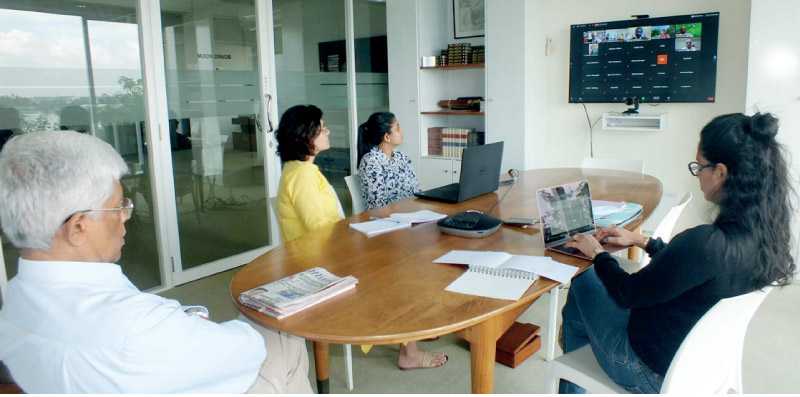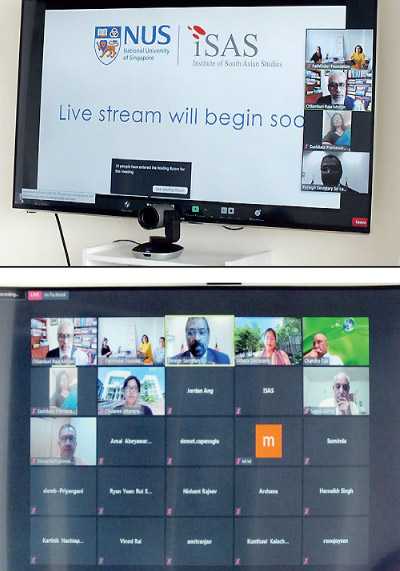Thursday Feb 26, 2026
Thursday Feb 26, 2026
Friday, 2 October 2020 00:45 - - {{hitsCtrl.values.hits}}

 A webinar jointly organised by the Pathfinder Foundation and the Institute of South Asian Studies (ISAS), of the National University of Singapore was held recently. Titled “Sri Lanka’s Foreign Policy Imperatives under the Rajapaksa Administration”, the presentation was delivered by Foreign Secretary of Sri Lanka Admiral Prof. Jayanath Colombage,
A webinar jointly organised by the Pathfinder Foundation and the Institute of South Asian Studies (ISAS), of the National University of Singapore was held recently. Titled “Sri Lanka’s Foreign Policy Imperatives under the Rajapaksa Administration”, the presentation was delivered by Foreign Secretary of Sri Lanka Admiral Prof. Jayanath Colombage,
The webinar saw participation of over 100 government officials, scholars, academics, representatives of think-tanks, private sector participants, students and other professionals from around the world. The speaker made a sound, well-informed, insightful presentation on a topic that is of considerable interest to many.
At the outset, Foreign Secretary Colombage said the current administration should be referred to as the ‘Administration of the government of Sri Lanka’, rather than the ‘Rajapaksa Administration’, highlighting the fact that although the Executive and the Head of the Legislature are both of the same family, they were elected in two democratically held free and fair elections in November 2019 and August 2020.
With regard to the foreign policy of the present administration, the speaker briefly referred to the history of foreign relations of the island nation. The 30-year separatist war and the defeat of terrorism, with a clear strategy adopted since 2005, was shown as a turning point with decisive political leadership. Thereafter, the focus of the government was on the development needs of the country, such as infrastructure, ports, airports, power generation, roads, railways, water purification and distribution, to name a few. These required international financing and investment, which was hard to come by due to alleged human rights violations. The speaker highlighted the support of India that provided assistance for clearing landmines, developing railway lines, reconstructing the harbour in the Northern Province, and building homes in the conflicted affected areas as well as other areas of the country.
However, as the development needs of the country were far greater than the assistance received, China entered the stage, he said. He recalled that China played a crucial role during the separatist conflict by providing military hardware that had been denied by other countries. Thereafter, from 2009-2014, Chinese state-owned companies and private enterprises gradually entered the country, making China the most prominent development partner, surpassing Japan - which raised eyebrows in certain quarters.
The above mentioned events set the stage for the current foreign policy imperatives, the speaker observed. He explained that the lessons learnt from the ongoing COVID-19 pandemic-induced situation, and understanding the geo-political environment, have enabled President Gotabaya Rajapaksa to identify three pillars for his strategy - national security, economic development and foreign policy. The main approach or imperative of the new foreign policy was highlighted as “neutrality” and friendship with all, which the President has repeated on many occasions.
In addition, the Foreign Secretary highlighted the need to advance and project the country’s national interests through its foreign policy. The President’s affirmation that Sri Lanka should not be a cause for India’s strategic security concerns was also highlighted. He also emphasised the need for more cooperation with regional groupings such as SAARC and BIMSTEC for maintaining regional security, stability and prosperity. Observing the importance of the oceans, the creation of a blue economy as a working proposition was also highlighted. Sri Lanka’s proposal in 1971 that the Indian Ocean be declared a zone of peace, which was adopted by the UN General Assembly but never implemented, has resulted in the Indian ocean becoming one of the most militarised in the world, he said, pointing out that the Sri Lankan administration does not wish to be part of the global power rivalry currently taking place in the region. Being mindful of the importance of country’s geo-strategic location and its advantages, the focus will be on using that advantage to develop the country.
Lastly, Foreign Secretary Colombage emphasised how the Sri Lankan diplomatic missions in their respective countries could channel trade and investment, thereby assisting in the post-COVID development efforts of the country.
ISAS Director Dr. Raja C. Mohan, moderated the discussion, and having highlighted the fact that the Pathfinder Foundation had organised two conferences on the role of Trincomalee in 2017 and 2018, inquired what development plans the government have with regard to the development of Trincomalee.